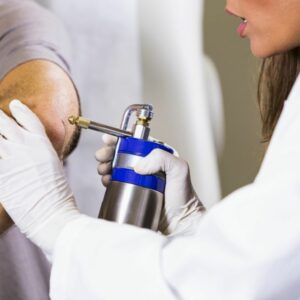Cryotherapy is a medical procedure that involves the use of extremely cold temperatures to destroy or remove abnormal tissue.
This can be done using liquid nitrogen, which is applied to the affected area using a spray or probe.
Cryotherapy is often used to treat a variety of benign skin lesions, including warts, actinic keratoses, and seborrheic keratoses.
Warts are small, benign growths that are caused by the human papillomavirus (HPV). They can appear anywhere on the skin, but are most common on the hands and feet. Cryotherapy is an effective treatment for warts, as the cold temperatures destroy the infected cells and cause the wart to eventually fall off.
Actinic keratoses are scaly or crusty patches of skin that are caused by sun damage. They are considered precancerous and can develop into squamous cell carcinoma if left untreated. Cryotherapy is often used to treat actinic keratoses, as it destroys the abnormal cells and prevents them from becoming cancerous.
Seborrheic keratoses are benign growths that appear on the skin as raised, waxy, or scaly lesions. They are often found on the face, chest, and back, and can range in color from light tan to black. Cryotherapy is a commonly used treatment for seborrheic keratoses, as it removes the growths without leaving a scar.
Cryotherapy is a safe and effective treatment option for many benign skin lesions.
It is a relatively painless procedure and has minimal side effects.
However, it is important to note that cryotherapy should not be used to treat moles or other suspicious skin growths, as these should be evaluated by a dermatologist to rule out the possibility of skin cancer. I would check all lesions before I remove them to ensure theyre benign, if I have any doubts I would recommend you get the lesion biopsied or excised.
In conclusion, Cryotherapy is a good option for treating benign skin lesions like warts, actinic keratoses, and seborrheic keratoses. It’s safe, effective, and relatively painless. It’s important to consult with your GP or a Dermatologist if you have any concerns about any lesion on your skin.
If you have been diagnosed with a benign lesion and would like it removed then do get in touch for more information, or to book.
Best Wishes
Louise, Dermatology Nurse.

